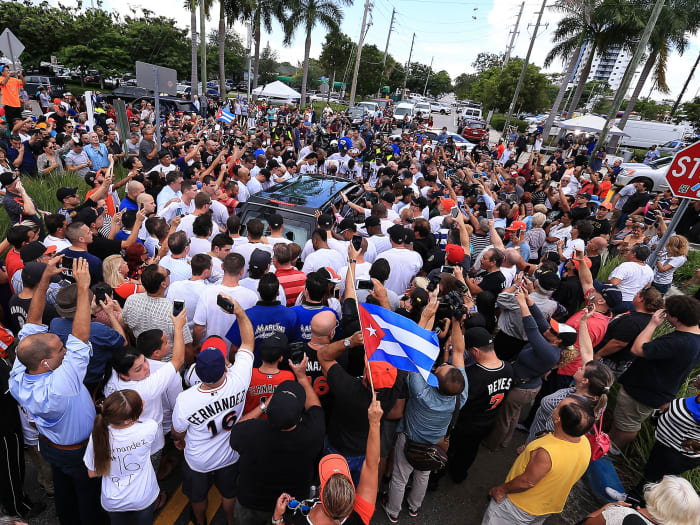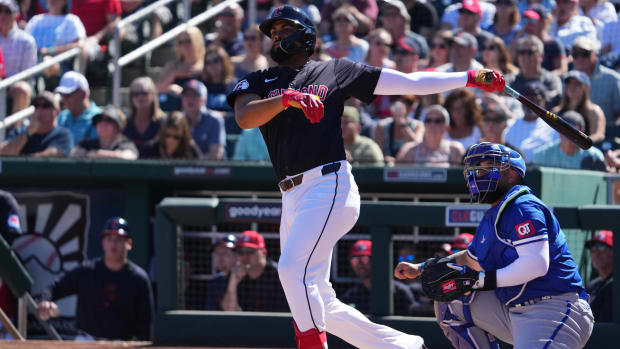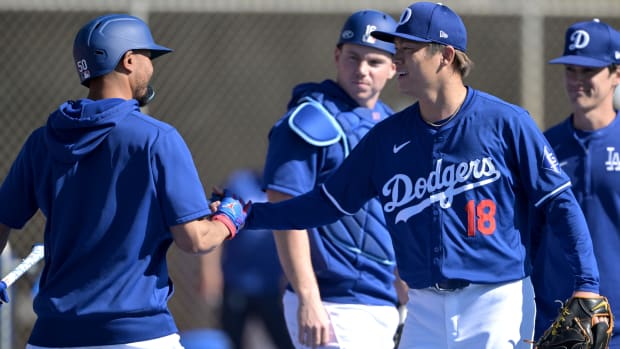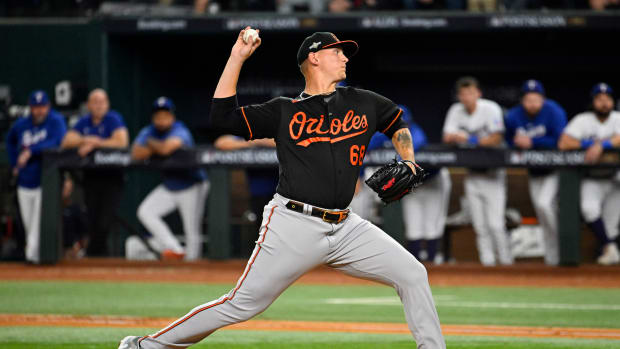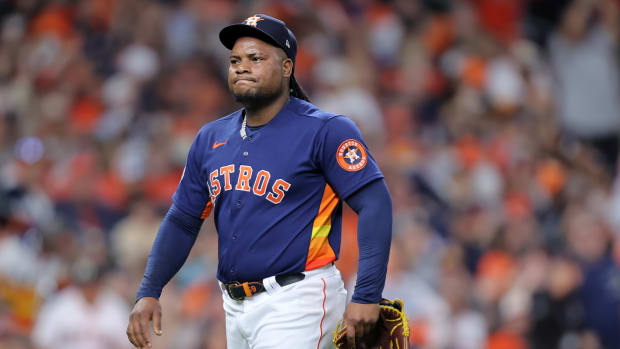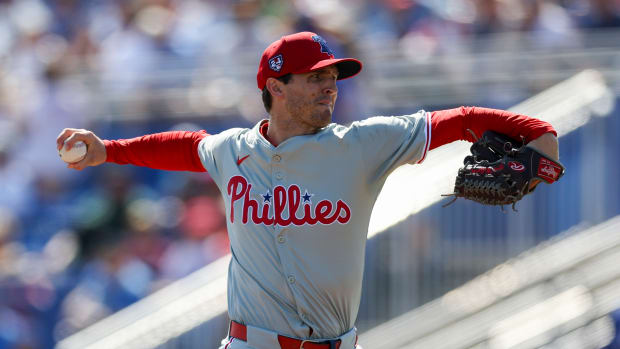Jose Fernandez's death hit hard for the Marlins, baseball and Cuban-Americans
This story appeared in the Oct. 10, 2016 issue of SPORTS ILLUSTRATED. To subscribe to the magazine, click here.
When the rain began, some mourners held out a hand and sort of smiled—of course, rain—while others looked down, jaws tightening. A few sought cover next to the looming ballpark, but not many, and not the players and coaches who just a minute before had filed out to wait in the middle of NW 6th St. The hearse was coming. Everyone knew. Onlookers tracked its progress via helicopter feed on shared smartphones, staring at the lone black Cadillac as it sailed along a strikingly emptied 836 East. Now you could hear that helicopter, above, hovering in the sky.
It was just past 2 p.m. on Wednesday, Sept. 28, the fourth day since the death of Jose Fernandez. Still the rain fell, but it wasn't the usual Miami afternoon deluge: The sun kept blazing and the light shower felt like relief, and the Marlins' owners and office staff, the exhausted players and coaches all wearing white T-shirts with rip emblazoned on front, couldn't help but see it as another sign. Didn't weeping Dee Gordon, in their first game back after their teammate died, lead off with his first home run of the year, the longest shot of his life? Didn't slow-afoot Justin Bour, that dizzying Monday night, leg out his first-ever triple? Didn't the shattered players, all wearing Fernandez's number 16, somehow hold on to beat the playoff-chasing Mets, 7–3?
"That was God letting Jose shine through us one more time," Gordon said later. "Then today, when they drove him up? Right before it rained on us and then, as soon as he drove up, it was just ... gone. That's crazy."
But true: A siren sounded and then the car bearing the casket bearing the 24-year-old body of Fernandez—Cuban-born, survivor of Fidel's jails and a raft on the Caribbean Sea, the most brilliant pitching talent of his generation—nosed into view. By then the first shock over the high-speed, 3 a.m. crash of his speedboat into a South Beach jetty on Sept. 25, which also killed friends Emilio Macias, 27, and Eduardo Rivero, 25, had ebbed. Now the impact of his loss upon his team, sport and community began to surreally hit home.
"It was," said Ron Yacoub, the physical therapist who shepherded Fernandez through rehab after his 2014 Tommy John surgery, "upside-down world."
Indeed. Long derided for tin-eared relations with South Florida leaders and fans, owner Jeffrey Loria and Marlins management navigated the immediate aftermath with surprising deftness. A lone trumpet played a heart-crushing "Take Me Out to The Ballgame" to mark Monday's return to play. Fernandez's number was retired. The funeral procession would go on to hit the touchstones of the stricken Miami exile community—moving from here in Little Havana to a blessing at the Shrine of Our Lady of Charity to an impromptu stop at Westchester's La Carreta restaurant, where Fernandez ate pregame meals and employees raised their cups in a final cafecito toast. Never before had the team seemed so in tune with local sentiment.
"I don't remember an outpouring of sadness as big as this in my 56 years here," Miami mayor Tomas Regalado, born in Havana, said last Friday. "This was extreme. I know Joselito was popular and the fans and the millennials and old people loved him. But I didn't know it would hit them so hard. People are still crying."
Jose Fernandez's tragic death darkens one of baseball's brightest lights
Now the struggle to make sense of the senseless, usually invisible and silent, took topsy-turvy form outside Marlins Park. A game was scheduled, but players and fans accustomed to regarding each other inside a posh facility designed to showcase supreme vitality, with a firm line between field and seats, gathered on a narrow street. The players wore T-shirts; the fans wore Marlins jerseys with numbers and names on the back: Who was who? And now the dead man came rolling in.
At first sight of Fernandez's hearse, the crowd of 3,000 let out a quick collective roar, then went stone quiet, then applauded softly. The players surrounded the long car, bowed their heads. Some stared at the casket through the glass. Some removed their hats. The players, along with Loria and president David Samson and manager Don Mattingly, ringed by staff members, stood there five minutes, praying, weeping. It was all remarkable.
Because though much was said last week about Fernandez's exuberance, his smile and charm, it wasn't just opponents that he could rub the wrong way. Over the season's endless grind, Fernandez also "pissed us off," said Marlins slugger Giancarlo Stanton, butting heads with teammates and coaches over everything from loud talking in the clubhouse to training habits that could make it seem as if he operated by his own set of rules.
"A lot of things about Jose would kind of drive guys nuts," Mattingly said. "There was talk about, 'Hey, you're not being a good teammate,' and you don't talk about those now, but he could get under your skin a little, and you're, like, 'Ahhhh. I got to talk to Jose about that today.'"
Yet Stanton, usually so reserved, was so wracked by emotion in the team's first game after Fernandez's death that his face looked like it was melting. He called Fernandez his "brother," scratched I LOVE YOU, BUDDY in the dirt, and—as they gathered at the mound in tribute—stunned all who knew him by telling his teammates that he loved them, too.
"All I wanted to do was text Jose, saying, 'You're not going to believe which ones are crying the most,'" Yacoub said. "He would have been cracking up, saying, 'You've got to be s------- me!' But every single player that I thought would've said, 'Screw him. What an a------ that he did this...,' they were all holding me crying like I was their wife. This was another level of emotion—the kind that only Jose could've produced."
Now it was two days later, 2:14 p.m. Now every Marlin had a hand on the hearse. The driver put the car in gear and began to move down NW 6th. That was the original plan: The hearse would stop, the players would pay their respects and file back into the ballpark, the car would move on. But the Marlins couldn't let go. They started walking. Some players kept their hands on the hearse as it rolled toward the intersection with NW 16th Avenue. Gordon burst into tears. "I was just talking to Jose, telling him how much I miss him," he said. "I kissed the back window."
"I learned more from Jose than he learned from me," Mattingly said. "I learned that joy. Think about what's going on here: It wouldn't happen with everyone. There's something he touched you with, that spirit as much as anything. How pure that was."
And how deadly. Yes, Fernandez's 2013 Rookie of the Year season, his astonishing 26–2, 1.49 ERA home record, and instant connection with fans all rose out of that purity. So did the Sunday wreckage on the rocks off South Beach.
"He lived his life too intensely," said Orlando Chinea, the Cuban-born pitching coach who guided Fernandez after he arrived, at 15, in Tampa in 2008 and always used his middle name, Delfin. "Everybody needs to have balance, but about that Delfi didn't care. He lived too intensely and that's why he killed himself. Like a kid. He was so amazing. Because he never was scared."
Like a kid. You heard that all the time about Jose Fernandez; it was part of his identity from his first major league start in 2013. Older Cubans in the city called him Joselito because he gave off the vibe of everybody's favorite son—scampish, spoiled and oh-so-charming. Stanton, just two years older, didn't bother with diminutives; he dubbed Fernandez Niño, because that year, even before their first confrontation in spring training, he had sensed an immaturity that just might hurt.
"The first and only time I faced him, he hit me in the head, first pitch," Stanton said. "I didn't know him, really, but I was pissed because I almost knew that it was going to happen: He's going to try and throw this ball a thousand miles an hour, because he's going to say, 'Stanton can't hit my fastball,' and it's going to slip. And sure enough it did."
Stanton stalked into the training room, vision blurry, where Fernandez soon found him. His remorse was as obvious as his 100-mph fastball; that too was a hallmark. Fernandez "lived his life out loud," with little filter on his emotions or words, said Angela Smith, the Marlins' longtime head of community outreach.
"Everyone has a child or niece or nephew who come over and they're screaming, and you can't comprehend: Why can't this kid behave? " Stanton said. "That's how he was: A little kid in a grown-up body.
"Sometimes you had to kick him in the butt and say, 'People just don't do that.' Like him flexing on an irrelevant single: 'Dude, what is THAT?' But it all came from a joyful heart, which is why you'd say, 'Josie, shut up, because this ain't the time.'"
To which, Fernandez would wonder: Why shut up? Why wait? The central fact of his life, of course, was the escape—after three previous tries had landed him, at 14, in a packed Cuban jail cell with adult felons and killers—from Cuba with his mother, Maritza. Fernandez risked everything to flee a nation where everyone parses their words and waits forever in line for the most basic necessities, even dived en route into the Caribbean to save his mother from drowning. "You don't understand freedom: You were born into it," he'd tell his American friends and bosses. "I understand. I had to get freedom.'"
Watching Jose Fernandez pitch was great. Seeing him around others was even better
So whenever Fernandez sought thrills in the eight years since, it felt less about defying death than consuming—whole and fast—his ever-more promising, rich, dreamland of a new life. Some reports speculated that a spat with his pregnant girlfriend, Maria Arias, led him first to his 32-foot speedboat, Kaught Looking, then to a waterfront gastropub, American Social, around 1 a.m. (Both Maritza Fernandez and Arias declined SI interview requests.) He had asked some teammates, including Yelich and best friend Marcell Ozuna, to join him that night. Christian Yelich planned to go to the bar but got sidetracked; Ozuna demurred. Fernandez wasn't starting the next day's afternoon game. They were.
"I said, 'No, I'm going to stay with my kids,'" Ozuna, 25, said. "I told him, 'Go to your house and get close to the baby, touch her belly, and tomorrow is the game. Then you wake up and see the news ... and your heart just breaks." Ozuna was always telling Fernandez to slow down. He wonders if he might have been able to save him, had he gone.
"Yeah, maybe I can tell him 'Go slow,'" he said. "Or maybe I die too, you know? Because life goes quick."
Whether alcohol or drugs were involved in the crash—and whether Fernandez was even piloting the boat—remains unclear; toxicology reports on the bodies have yet to be released. But few believe that Fernandez, once he had his mind set, would've been easy to dissuade.
"Jose was so young that he still thought that what he knew was everything," said Samson. "That was the problem: The certainty of youth with the desire to live with what freedom provides. That's where we had our conflicts—his life choices—but it was out of love, almost father-son. It was like what his teammates told him: 'There's no reason to go on the boat tonight. Why go?'
"But his answer always was, 'Because I can.' His answer today, to why he went on the boat Saturday night, would be, 'Because I can.' But Jose, it's a bad decision; it's nighttime: Why? And he'd say, 'I'm free. I'm free to choose, I'm free to go on the boat. So I'm going.'"
Late last year Fernandez turned down the Marlins' long-term contract offer (all of the team's long-term contracts include stipulations against recreational boating), intending to test the free-agent market after the 2018 season. "I'm betting on myself," he told Samson. Why not? All his other gambles had paid off. When Fernandez arrived at Tampa's Alonso High in '08, the penniless kid from Santa Clara announced to its principal, Louis Diaz, "I'm Jose. I come from Cuba. I want to play baseball."
"Jose Fernandez did everything I told him to do except go to class," Diaz told SI in 2014. "Jose has no interest in school whatsoever. But he made it. He earned it."
During his short stint in the minor leagues, in 2012, Fernandez was surrounded by future Marlins like Adam Conley, J.T. Realmuto, Ozuna and Yelich. "I would talk to J.T. all the time, and we'd be, 'I wonder if we're going to make it to the big leagues,'" Yelich said. "Jose was: 'I'm going to be in the big leagues, I'm going to play for this many years, I'm going to play for these teams.' He told me he was going to be a starter for so many years, then he was going to be a closer for so many years. This dude just knew. And you didn't doubt it."
Yet it wasn't all about him. Very quickly, even as Fernandez's star began blazing in his rookie year, he made it clear to Marlins staffers that they needn't request whether he had time for an ill or needy child. "Don't ask me," he said. "Tell me." His final night on a baseball field, he hurried out to spend time and present an autographed bat to a bedridden 20-year-old named Cristina Llanes.
"Some guys are just a pain in the ass to work with; that's what made him rare," said Marlins community outreach manager Juan Leonel Garciga. "Jose would go out of his way to really make himself available and try to make a difference. He was unlike anybody I've ever worked with or met in baseball."
MLB pays tribute to Jose Fernandez
Still, some outsiders only saw Fernandez's broad grin and demonstrative antics on field, and found it all maddening. Ignoring the fact that the Cuban game is far mouthier and confrontational, old-schoolers often cast Fernandez as epitome of youngster "disrespect" in the endless war over baseball's "code." Exhibit A was his first career homer in 2013, when he stared the ball over the leftfield wall, then spit near Braves third baseman Chris Johnson while heading for home. The benches cleared; Johnson rushed in to scream at Fernandez. He later apologized to the Braves, but the bad feelings lingered—right up until a nervous Johnson signed with the Marlins last January.
"I couldn't have been more wrong," Johnson said.
Fernandez was the first player to welcome him. "We can be friends now, but when I face you in live BP, I'm going to hit you," he joked—maybe. Johnson loved it. Then day by day the son of a big leaguer, a lifetime carrier of the code, watched Fernandez go to work.
"How he treated me, how he went about his business, how he was the same when he won or lost, loud and smiling: It made me think this kid is not showing up the game," Johnson said. "He's not showing any player up. He's out there completely free, having as much fun as possible. And then him getting out of Cuba, we talked about how he got caught and went to jail and didn't see his mom, and didn't know how long he was going to be in jail because they don't tell you over there: stuff I never knew. I'm mad at myself for having that altercation...."
Johnson paused, eyes reddening. His voice cracked.
"He changed me," Johnson said. "I smile. Before, I was always intense and took the game as a job and had to make it, and had to stay in the big leagues, had to get the contract, had to be the guy. No: You don't have to do anything. You made it, you got to the big leagues, you're in the United States of America, got a beautiful family. The game is fun. He played the game how I played the game in Little League. That's how everybody should be in the big leagues."
Asked if he ever told Fernandez that, Johnson shook his head. "No," he said, so softly that he had to repeat it. "But I'll tell him one day."
Five days before the crash two things convinced those close to him that Fernandez was readying to leave childhood behind. The first, his longest and finest performance since returning from a 14-month layoff due to elbow surgery, was the three-hit, 12-strikeout, 1–0 shutout over the first-place Nationals. His fire wasn't rare. "I'm perfect," Fernandez snapped, when Mattingly asked if he could go eight innings for the first time all season. "I could go nine. I feel perfect!"
But the focus was strikingly new. "The most locked in I've ever seen him," Gordon said. For once Fernandez didn't brag about his hitting, or take bets in the on-deck circle. Gordon tried baiting him, but Fernandez said, "Doggie, I don't care. I'm ready to get back on the mound." It was the hard-eyed look of a veteran.
The second thing was Fernandez's announcement, with a photo of Arias cradling her belly on his Instagram feed, of their pregnancy. "I'm so glad you came into my life," he wrote. "I'm ready for where this journey is gonna take us together. #familyfirst." In the ensuing days Fernandez buttonholed any family men to find out how much his life would change with a newborn daughter. He seemed pleased. Teammates thought it might prove the final maturing factor.
"All day when he get to the clubhouse, he talked about the baby," said Ozuna. "He showed me pictures of the baby, the belly, and tell me when his girl felt the baby move—and laughed. And I'd tell him, 'You're going to see reality when that baby comes. He was going to know how important it is that he's alive. He was just starting to understand."
Fernandez, an avid fisherman, was drawn to water like many Cuban exiles. They are an island people, after all, long cut off from the world by Castro's rule and taunted by the promise and peril of the Florida Straits. Many in Miami have lost or reclaimed family there, and saw in Fernandez's rise a reflected victory. TU ERES NUESTRA HISTORIA, said one poster amid the balloons and flowers and caps and photos at the makeshift memorial outside Marlins Park. YOU ARE OUR STORY—THE CUBAN STORY.
"Everybody talks about it: The sea brought him and the sea took him," Regalado said. "Water has meant freedom and death for so many. It resonates."
Ozuna, a Dominican, doesn't tread that deeply. His best friend is dead, and in the week after he barely slept. Sometimes, in the dark, he tried pushing Fernandez out of his mind. "But sometimes I'm imagining him close to me," Ozuna said. "I know what he's going to tell me: About his little daughter coming. He's going to tell me, 'Take care of my little daughter and be happy with my family all the time, like we always are.'"
On Wednesday, 45 minutes after the hearse drove away, the Marlins players and coaches—still in their white T-shirts—left the clubhouse, walked through the ballpark underbelly and back out to write messages on the memorial wall. Ozuna hung back, holding a black marker, waiting until the others were gone. Then he climbed a step stool, raised his right hand as high as he could reach and began writing. It took six minutes. The humidity was stifling. He had to pause once to rest.
When he was through, Ozuna drew a black border around the words. Most were in Spanish. He promised to take care of Fernandez's daughter, said he loved him forever; at the bottom he scrawled three small hearts. Then Ozuna capped his pen. Someone yelled his name, and the outfielder lowered his head and hurried inside. The season was nearly over, and there was one last game to be played there.






























